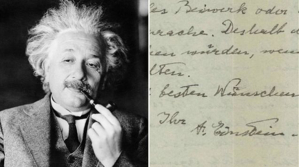
While Albert Einstein was a professed agnostic, a letter he wrote that described God as the creator has fetched a hefty sum at a recent auction in Massachusetts.
The 1925 letter was written to Italian electrical engineer Giovanni Giorgi to defend Einstein's theory of relativity from ten years earlier. The letter, uncharacteristically written in Italian, was penned after Einstein faced harsh criticism from American physicist Dayton Miller who aimed to disprove the now-famous theory.
In a move to discredit Miller's findings, Einstein wrote to Giorgi: "I agree with your opinion on the fact that the movement of an ether with a [mathematical formula] so high is particularly impossible.
"God created the world with more intelligence and elegance."
The letter fetched an impressive £49,000 (about $75,700 US), but no where near as much as Einstein's letter where he originally made it clear that he did not believe in God. That letter, written much later in 1954, was sold for $3 million.
The infamous "God letter" was written by Einstein to Eric Gutkind in response to the author's book "Choose Life: The Biblical Call to Revolt." Einstein, born Jewish, was not shy about his disdain for religion.
"The word God is for me nothing more than the expression and product of human weaknesses, the Bible a collection of honorable, but still primitive legends which are nevertheless pretty childish," Einstein wrote in the 1954 letter. "For me the Jewish religion like all other religions is an incarnation of the most childish superstitions. And the Jewish people to whom I gladly belong and with whose mentality I have a deep affinity have no different quality for me than all other people."
It's the popularity of that "God letter" that makes this more recent find all the more interesting. A spokesperson for RR Auction in Boston, where the auction was held, stated that the letter is just full of incredible information. "This magnificent letter is rife with intriguing content - each and every sentence contains a revelatory turn and could be expounded upon at length within the context of Einstein's life and work," the spokesperson said. "That it is written in Italian is notable in itself. His family had moved to Italy for a few years in the mid-1890s and, although he was fluent, letters in Italian are seldom seen."
"The discussion of God as a creator is also fascinating," the spokesperson continued. "Although he did not believe in a personal deity, Einstein was not averse to speaking of God in a scientific context when discussing differing interpretations of quantum physics.
"In 1929, he said that he believed 'in Spinoza's God, who reveals himself in the harmony of all that exists,' and in the 1950s he wrote 'If something is in me which can be called religious then it is the unbounded admiration for the structure of the world so far as our science can reveal it.'
"It is this conception of God that appears in the present letter, with the idea of a world designed with 'intelligence and elegance' corresponding with these later notions of structural harmony."
Albert Einstein never used the term "atheist" to label himself, instead claiming to believe in the pantheistic God as described by Baruch Spinoza.
"I came-though the child of entirely irreligious (Jewish) parents-to a deep religiousness, which, however, reached an abrupt end at the age of twelve," Einstein wrote in his Autobiographical Notes. "Through the reading of popular scientific books I soon reached the conviction that much in the stories of the Bible could not be true."






